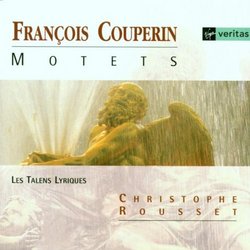It's a Privilege to be Able to Listen to this Music
Leslie Richford | Selsingen, Lower Saxony | 10/30/2004
(5 out of 5 stars)
"François Couperin (1668-1733), known als 'le Grand' to distinguish him from his various musical relatives, has been well-served by the revival of historical performance practice, but mostly it has been his music for solo harpsichord or his chamber music which has been recovered from the archives and recorded. But like his contemporaries, Couperin also wrote sacred motets, and it is one of Christophe Rousset's merits that he has unearthed these from the collections of manuscripts at Versailles and given them a superb airing on this recording. Of the 21 pieces to be heard here, 19 are short 'versets' (also known as 'elévations') for use during the services at the King's Chapel in Versailles where Couperin was employed from 1693 onwards. The two remaining pieces are much longer: the motet 'Veni sponsa Christi' for St. Susanna lasts almost eighteen minutes and contains some of the most joyful music imaginable, particularly in its refrain 'Jubilemus, exultemus, resonet coelum plausibus'; and the last piece on the CD, the early motet 'Laudate pueri Dominum' lasts around twelve minutes. But I suppose it is typical for Couperin that he concentrates on perfection in the miniature forms, here using solo voices (occasionally expanded to duets or alternating) and a chamber-music style accompaniment (Les Talens Lyriques consist here of two violins, two traverse flutes, two baroque oboes, a bass viol and a harpsichord). The voices are modelled on what is known of the singers at Versailles, and Couperin actually named these in his manuscripts, many of the soprano parts having been written specifically for his young cousin Marguerite-Louise Couperin; Rousset's only compromise here is that where castrati are required in the manuscripts he does not use countertenors but his two wonderful female singers, Sandrine Piau and Caroline Pelon, whose pure, more or less vibrato-less high soprano voices make such an impact, particularly of course on the first track of this CD where their voices emerge from the silence and intertwine with incredible beauty without any instrumental accompaniment. That, however, should not distract from the equally fine performances by Jean-Paul Fouchécourt, high tenor, and Jérôme Corréas, baritone. This is, from start to finish, wonderful music, intended only for the ears of the King of France and his immediate entourage.
The recording was made by Radio France in 1993 at the Notre-Dame du Liban church in Paris. Occasionally I felt that the instruments, especially the harpsichord, could have been a little more present, the engineers obviously preferring to put the voices in the foreground. I also found listening to this disc on headphones slightly more convincing than over loudspeakers, but that may be just a question of volume. At all events, the disc is a quite an experience and I felt privileged to hear it."


 Track Listings (21) - Disc #1
Track Listings (21) - Disc #1